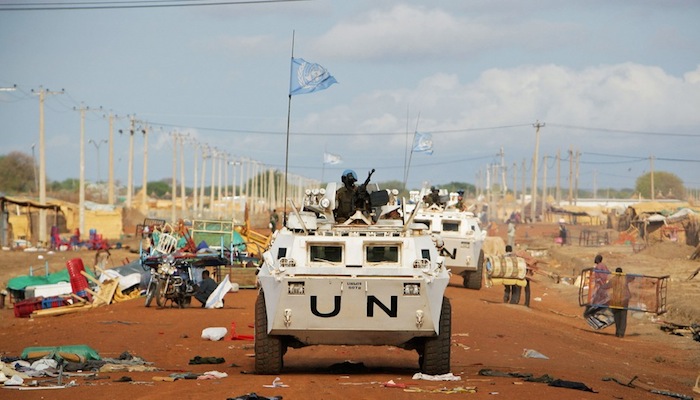دور قاعدة التقيد بالضرورة العسكرية المُلحة في حماية البيئة أثناء النزاعات المسلحة
The role of the base adherence to urgent military necessity In protecting the environment during armed conflicts

اعداد : د.حسين علي الدريدي – أستاذ القانون الدولي العام المشارك، كلية الحقوق جامعة الإسراء الخاصة – المملكة الأردنية الهاشمية
- المركز الديمقراطي العربي –
- مجلة القانون الدولي للدراسات البحثية : العدد العاشر تموز – يوليو 2022 المجلد 4, فصلية دولية محكّمة تصدر عن #المركز_الديمقراطي_العربي ألمانيا – برلين.
- تُعنى المجلة في الأبحاث والدراسات القانونية في مجال القانون الدولي بمختلف فروعه ومجالاته ، تصدر بالتعاون مع مخبر الدراسات القانونية و مسؤولية المهنيين – جامعة طاهري محمد ببشار- الجزائر..تصدر بشكل دوري ولها هيئة علمية دولية فاعلة تشرف على عملها وتشمل مجموعة كبيرة لأفضل الاكاديميين من عدة دول ، حيث تشرف على تحكيم الأبحاث الواردة إلى المجلة . وتستند المجلة إلى ميثاق أخلاقي لقواعد النشر فيها، و إلى لائحة داخلية تنظّم عمل التحكيم ، كما تعتمد في انتقاء محتويات أعدادها المواصفات الشكلية والموضوعية للمجلات الدولية المحكّمة.
للأطلاع على البحث من خلال الرابط المرفق :
ملخص :
إن قاعدة التقيد بالضرورة العسكرية الملحة لاستخدام القوة المسلحة، أثناء اندلاع النزاعات المسلحة، ذات الأصل العرفي، يمكن الاستناد أليها، إذا ما تم التقيد بشروطها وأركانها، التي سنحاول الوقوف عليها في هذا البحث، لتوفير حماية فاعلة للفئات المحمية بقواعد القانون الدولي الإنساني، ومنها البيئة المحيطة بالعمليات العدائية، وتعني هذه القاعدة، استخدام الوسائل والأساليب العسكرية المشروعة، والضرورية لحظة اتخاذها، في ظل الظروف السائدة، لتحقيق ميزة عسكرية وفقاً للغاية المشروعة من الحرب، بحيث لا بد لاعتبار العمل العسكري المُتخذ عملاً عسكرياً تمليه الضرورة العسكرية – ويبرر بالتالي الخروج على بعض قواعد الحماية المقررة بموجب القانون الدولي الإنساني –أن تكون الوسائل والأساليب القتالية المتخذة مشروعة أصلاً، بموجب قواعد القانون الدولي الإنساني، وأن تكون الوسائل والأساليب القتالية المستخدمة – بالإضافة إلى كونها مشروعة – ضرورية لحظة اتخاذها في ظل الظروف السائدة لتحقيق ميزة عسكرية، وأن تكون الوسائل والأساليب القتالية (المشروعة والضرورية لحظة اتخاذها) محققة لميزة عسكرية متفقة مع غاية الحرب وهي إضعاف القوة العسكرية للعدو،
وقد تطرقنا في هذا البحث، لبيان دور هذه القاعدة، في حماية أحد العناصر المدنية غير المساهمة بالعمل القتالي، وهي البيئة، الأمر الذي دفعنا للوقوف على مفهوم البيئة، كإحدى الفئات المحمية بقواعد القانون الدولي الإنساني، وأنها كل ما يحيط بالعمليات العدائية، من عناصر مدنية، حيث أن الفقه الدولي، مد مفهوم البيئة، لتشمل كل عنصر مدني لا يساهم مباشرة بالعمل القتالي. ولم يقصرها على المفهوم الطبيعي الضيق للبيئة، كما فعل القانون الدولي الإنساني.
وقد تطرقنا –كذلك – لمفهوم قاعدة التقيد بالضرورة العسكرية الملحة لاستخدام القوة القتالية، ودورها في توفير حماية فاعلة للبيئة، وغيرها من الفئات المدنية غير المساهمة مباشرة في العمل العسكري.
وقد التزمت في هذا البحث بالمنهج الاستقرائي، والتحليلي، بحث توصل البحث إلى بعض النتائج، مع تقديم التوصيات لتوفير حماية حقيقية للبيئة أثناء النزاعات المسلحة.
Abstract
The rule of adherence to the urgent military necessity to use armed force, during the outbreak of armed conflicts, of customary origin, can be relied upon if its conditions and pillars are complied with, which we will try to stand on in this research, to provide effective protection for groups protected by the rules of international humanitarian law, including the environment Surrounding hostilities, and this rule means the use of legitimate and necessary military means and methods at the moment of their taking, under the prevailing circumstances, to achieve a military advantage in accordance with the legitimate purpose of war, so that the military action taken must be considered a military action dictated by military necessity – and thus justify deviating from some The rules of protection established under international humanitarian law – that the means and methods of warfare taken are inherently legitimate, according to the rules of international humanitarian law, and that the means and methods of warfare used – in addition to being legitimate – are necessary the moment they are taken under the prevailing circumstances to achieve a military advantage, and that the means and methods are The combat (legitimate and necessary at the moment of its adoption) achieves a military advantage consistent with the purpose of the war, which is to weaken the mighty force An enemy ball,
We have dealt with in this research to clarify the role of this rule in protecting one of the civilian elements that do not contribute to combat action, which is the environment, which prompted us to stand on the concept of the environment, as one of the categories protected by the rules of international humanitarian law, and that it is all civilian elements surrounding hostilities. Whereas, international jurisprudence extended the concept of the environment to include every civilian component that does not directly contribute to combat action. He did not limit it to the narrow, natural concept of the environment, as did international humanitarian law.
We have also touched on the concept of the rule of abiding by the urgent military necessity to use combat force, and its role in providing effective protection for the environment and other civilian groups not directly participating in military action.
In this research, I adhered to an inductive and analytical approach, a research that reached some results, while providing recommendations to provide real protection for the environment during armed conflicts.




